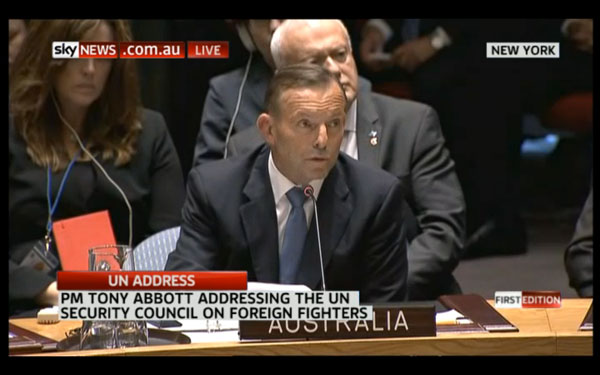Tony Abbott’s ambition to become the “Prime Minister for Aboriginal affairs” doesn’t align with his position on climate change, with First Nations communities the most vulnerable to the disastrous effects of global warming, according to a young Bundjalung environment warrior.
Abbott drew condemnation last week after he dodged a United Nations climate change summit attended by 120 world leaders, including US President Barack Obama. Abbott jetted into New York a day later to attend UN Security Council talks on the situation in Iraq and Syria, and Western responses to militant Sunni group the Islamic State.
In a speech to the UN General Assembly, Abbott fudged on the threat to the world posed by climate change, instead elevating the “murderous rage” of the Islamic State, the “Russian aggression” in Ukraine, the Ebola crisis in West Africa and the situation of the world’s economies above it.
It came in the same week President Obama labelled climate change a greater threat to the world than terror and pointed the finger at Abbott and other heads of state absent at the talks, pointedly noting “no-one gets a pass”.
Abbott also came under fire earlier this year for taking climate change off the agenda at key G20 talks in Brisbane in November, despite the issue being on the agenda of the past three G20 meetings, which bring together the heads of the world’s 20 leading economies.
While Abbott claims to be a champion of Aboriginal rights, 20-year-old Bundjalung climate change activist Amelia Telford says the Abbott government needs to understand the situation facing First Nations communities, many of whom will be most adversely impacted by the effects of climate change.
“Abbott hasn’t connected the dots,” Ms Telford told New Matilda.
“The government is taking us backwards compared with the rest of the world. We are living in a country where Indigenous people have barely contributed to what is causing climate change….
“(But) the most vulnerable communities within Australia – Aboriginal and Torres Strait Islander communities – are going to be impacted more than any other community and we need our government to recognise that.
“We aren’t seeing that leadership and so there is an opportunity to stand up for ourselves and begin a movement lead by our people.”
Ms Telford was speaking ahead of a historic summit organised by the Australian Youth Climate Coalition, which will bring together 50 young Aboriginal and Torres Strait Islander youth from around the country to talk about climate change. Dubbed the ‘Seed summit’, it will kick off in Melbourne this weekend.
While Aboriginal youth have largely been voiceless in climate change talks and activism, Ms Telford says it is critical our young people are at the forefront.

She says it’s been hard to raise awareness because of the dire social issues afflicting First Nations youth, and the influence of the fossil fuels industry within First Nations communities.
“We know that Indigenous people across Australia have been looking after our lands for tens of thousands of years and it gives us hope that we can do it again. But there are so many structural issues within our communities so it’s hard for young people to prioritise it.
“… There are more and more of us coming out and talking about climate change, sustainability and caring for country but there are so many things competing for our attention.
“It can be a tricky issue because of the fossil fuel industry and the massive impact and stress of that on our land and culture for decades.”
It becomes hard to advocate for solutions to climate change if you are forced to rely on the mining industry, Ms Telford says.
But she says rather than just targeting government, the Seed summit also hopes to put a declaration to the four leading banks asking them not to invest in coal ports on the Great Barrier Reef.
“We need to get climate change on the agenda of our politicians, but it also involves engaging with business leaders, rather than specifically government,” Ms Telford says.
“… We are calling on the CEOs of the four big Australian banks which are considering whether to fund coal ports on the reef. In this time in politics, where we are not seeing leadership from governments, we have to find ways to counteract that and figure out how we can make a difference.”
Ms Telford says she was surprised at the number of Aboriginal and Torres Strait Islander youth who wanted to get involved in climate change advocacy. The summit received 30 applications within a week of opening registrations.
“The young people are the ones with the most at stake,” Ms Telford says.
“Indigenous youth have to be at that forefront and the great thing is we are backed by thousands of young people all across the country.
“Knowing we are a part of that movement is pretty great.”
Donate To New Matilda
New Matilda is a small, independent media outlet. We survive through reader contributions, and never losing a lawsuit. If you got something from this article, giving something back helps us to continue speaking truth to power. Every little bit counts.



